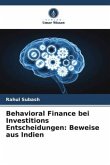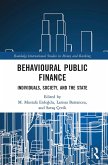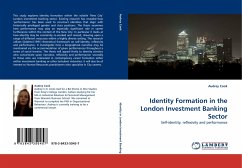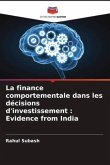Work investigates the influence of certain identified behavioral finance concepts (or biases), namely, Overconfidence, Representativeness, Herding, Anchoring, Cognitive Dissonance, Regret Aversion, Gamblers' Fallacy, Mental Accounting, and Hindsight Bias, on the decision making process of individual investors in the Indian Stock Market. Primary data for analysis was gathered by distributing a structured questionnaire among investors who were categorized as (i) young, and (ii) experienced. Results obtained by analyzing a sample of 92 respondents, out of which 53 admitted to having suffered a loss of at least 30% because of the crisis, revealed that the degree of exposure to the biases separated the behavioral pattern of young and experienced investors. Gamblers' Fallacy, Anchoring and Hindsight biases were seen to affect the young investors significantly more than experienced investors.
Bitte wählen Sie Ihr Anliegen aus.
Rechnungen
Retourenschein anfordern
Bestellstatus
Storno








